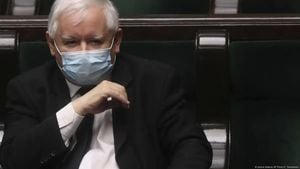Germany is on the brink of major political changes as the countdown to the 2025 Bundestag elections heats up. Recent polling trends indicate the Social Democrats (SPD) are making gains, with CDU leader Friedrich Merz projecting confidence even as the Union party’s numbers dip slightly. Merz, who is vying for the chancellorship, has voiced his predictions on the growing support for the SPD, which has recently bounced back to around 16 to 17 percent, up from previous lows of 14 percent. Meanwhile, the CDU’s support appears to hover between 31 and 32 percent.
Speaking on the podcast Table.Briefings, Merz expressed his expectation for the SPD’s rise, stating, "I have exactly counted on this. At the end, the SPD will likely have ‘a two’ at the start," hinting at his belief they could surpass the 20 percent threshold. The CDU leader elaborated on the necessity for his party to reach out beyond their core supporters to capture switch voters, explaining, "We need to now try to reach the switch voters out of the core constituency."
Despite facing criticism from other party leaders, Merz seems unfazed by the increasing popularity of the SPD, maintaining the stance of his party as stable and resilient.
One of the central themes shaping the current dialogue is the possibility of forming alliances, particularly with the Greens. Although there is some opposition within the Union, particularly from CSU chief Markus Söder who decisively rules out collaboration with the Greens, Merz is open to the idea. He underscored the importance of recognizing the need for centrist parties to maintain their cooperative capabilities, stating, "The parties of the center, including the Greens, must remain, of course, capable of cooperation and, at the end of the day, also capable of coalition."
Previously, Merz had firmly rejected any chance of working with the Greens, labeling them as regulatory-heavy, but now he seems to pivot on the approach. His openness marks a shift from earlier sentiments where he openly voiced his aversion, characterizing them as potentially detrimental to the electorate's interests.
Meanwhile, the Union's election program has come under scrutiny. Key complaints from the SPD and the Greens target the proposed tax cuts, which they deem unsustainably communicated without adequate funding strategies. SPD leader Lars Klingbeil criticized the CDU funding plan, which amounts to around 100 billion euros annually, noting, "It stands, but not a single proposal is outlined on how to finance this."
Defending the proposal, Merz remains assertive about the economic growth expected, arguing, "A one percent growth means ten billion euros more state revenue." He also aims to revamp the citizen’s income system, which has recently swelled to costs near 50 billion euros, claiming potential for significant savings to help balance budgets.
Looking to the near future, confidence among observers is palpable about the possibility of freestanding legislative shifts, especially as Scholz, the current chancellor from SPD, faces pressures leading to the vote of confidence. Speculation arises over whether the upcoming election will simply transform leadership or lead to significant shifts among existing alliances.
Florian Harms, editor-in-chief of t-online, discussed potential coalition dynamics during the Tagesanbruch podcast, indicating the possibility of new economic policies materializing post-election. He stressed the necessity for tactical communication from all parties as voters begin to engage seriously with the upcoming electoral decisions.
SPD’s moment of resurgence seems pivotal, and the groundwork laid now could steer public sentiment as they absorb the latest shifts of power dynamics within Germany’s political framework. Amid these discussions, underlying socio-economic conditions and debates over the return of Syrian refugees resonate with voters, marking areas ripe for strategic positioning by the candidates.
With both parties tightening their pitches and testing alliance waters, the potential transformation of Germany's political scene could leave lasting impressions well beyond the November voting date. Voters are paying special attention to these parties, taking note of proposed policies and assessing which direction their future inclines. The upcoming elections promise to encapsulate dissent of past governance, the challenge for adaptation, and the unyielding quest for coalition efficacy.



